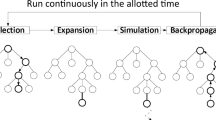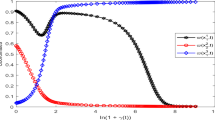Abstract
The process of computing the nucleolus of arbitrary transferable utility games is notoriously hard. A number of papers have appeared in which the nucleolus is computed by an algorithm in which either one or a huge number of huge linear programs have to be solved.
We show that on the class of veto-rich games, the nucleolus is the unique kernel element. Veto-rich games are games in which one of the players is needed by coalitions in order to obtain a non-zero payoff. We then provide a fast algorithm which does not use linear programming techniques to compute the nucleolus of these games.
Furthermore, we provide a few examples of economic situations which belong to the class of veto-rich games and which are treated in the literature.
Similar content being viewed by others
References
Arin J (1992) A study of Information Markets in a game theoretic framework. Document (in Spanish) of the Institute de Economia Pública, Basque University at Lejona, Spain
Chetty VK, Raghavan TES (1976) Absenteeism, efficiency and income distribution, Discussion Paper 7601. Indian Statistical Institute, New Delhi
Davis M, Maschler M (1965) The kernel of a cooperative game. Naval Research Logistics Quart 12: 223–259
Derks J, Kuipers J (1992) On the core and nucleolus of Routing games. Report M 92-07, University of Limburg, The Netherlands
Kohlberg E (1971) On the nucleolus of a characteristic function game. SIAM J Appl Math 20: 62–66
Kopelowitz A (1967) Computation of the kernels of simple games and the nucleolus ofn-person games. Research Memorandum 31, Research Program in Game Theory and Mathematical Economics, The Hebrew University of Jerusalem
Maschler M (1992) The bargaining set, kernel, and nucleolus. In: Aumann RJ, Hart S (eds). Handbook of game theory with economic applications 1, Handbooks in economics 11, Elsevier Science Publishers, Amsterdam 591–667
Muto S, Nakayama M, Potters J, Tijs S (1988) On Big Boss games. The Economic Studies Quarterly 39: 303–321
Muto S, Potters J, Tijs S (1989) Information Market games. Intern J of Game Th 18: 209–226
Potters J, Muto S, Tijs S (1990) Bargaining set and kernel for Big Boss games. Methods of Operations Research 60: 329–335
Schmeidler D (1969) The nucleolus of a characteristic function game. SIAM J of Applied Mathematics 17: 1163–1170
Schotter A (1974) Auctioning Böhm-Bawerk's horses. Intern J of Game Th 3:195–215
Shapley LS, Shubik M (1967) Ownership and the production function. Quarterly J of Econ 81:88–111
Author information
Authors and Affiliations
Additional information
This author's research was made possible by grant BFI AE 92/93 of the Department of Education, Universities and Research of the Basque Government.
This author's research was sponsored by the Foundation for the Promotion of Research in Economic Sciences, which is part of the Dutch Organization for Scientific Research (NWO).
Rights and permissions
About this article
Cite this article
Arin, J., Feltkamp, V. The nucleolus and kernel of veto-rich transferable utility games. Int J Game Theory 26, 61–73 (1997). https://doi.org/10.1007/BF01262513
Received:
Revised:
Issue Date:
DOI: https://doi.org/10.1007/BF01262513




